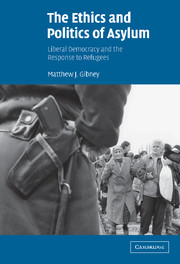Book contents
- Frontmatter
- Contents
- Acknowledgements
- Introduction
- 1 Partiality: community, citizenship and the defence of closure
- 2 Impartiality: freedom, equality and open borders
- 3 The Federal Republic of Germany: the rise and fall of a right to asylum
- 4 The United Kingdom: the value of asylum
- 5 The United States: the making and breaking of a refugee consensus
- 6 Australia: restricting asylum, resettling refugees
- 7 From ideal to non-ideal theory: reckoning with the state, politics and consequences
- 8 Liberal democratic states and ethically defensible asylum practices
- List of references
- Index
2 - Impartiality: freedom, equality and open borders
Published online by Cambridge University Press: 22 September 2009
- Frontmatter
- Contents
- Acknowledgements
- Introduction
- 1 Partiality: community, citizenship and the defence of closure
- 2 Impartiality: freedom, equality and open borders
- 3 The Federal Republic of Germany: the rise and fall of a right to asylum
- 4 The United Kingdom: the value of asylum
- 5 The United States: the making and breaking of a refugee consensus
- 6 Australia: restricting asylum, resettling refugees
- 7 From ideal to non-ideal theory: reckoning with the state, politics and consequences
- 8 Liberal democratic states and ethically defensible asylum practices
- List of references
- Index
Summary
If it be said that so broadly marked a distinction between what is due to a fellow countryman and what is due merely to a human creature is more worthy of savages than of civilized beings, and ought, with the utmost energy to be contended against, no one holds that opinion more strongly than myself.
John Stuart Mill 1993 [1861]Citizenship in the modern world is a lot like feudal status in the medieval world. It is assigned at birth; for the most part it is not subject to change by the individual's will and efforts; and it has a major impact upon a person's life chances … Liberals objected to the way feudalism restricted freedom, including the freedom to move from one place to another in search of a better life. But the modern practices of citizenship and state control over borders tie people to the land of their birth almost as effectively.
Joseph H. Carens 1992aIn Chapter 1 we saw both the force and the limitations of the partial viewpoint as an ethical guide for states in responding to refugees. Let us now turn to the dominant theoretical alternative to this perspective, the impartial view. Partialists, it will be remembered, worked with an ideal of states as cultural communities, claiming a right of self-determination on behalf of their citizens which justified exclusive privileges in entrance.
- Type
- Chapter
- Information
- The Ethics and Politics of AsylumLiberal Democracy and the Response to Refugees, pp. 59 - 84Publisher: Cambridge University PressPrint publication year: 2004

